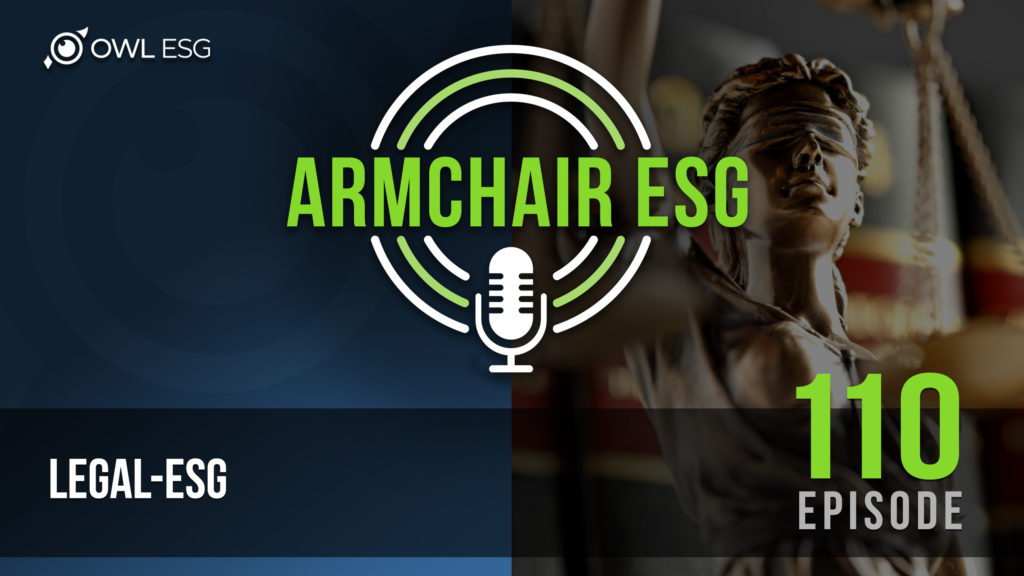One of the key pillars driving change and defining boundaries in the ESG space is the constant legal wrangling between shareholders, corporations, regulators, and the general public. There are a number of cases recently concluded, in progress, or just filed that will affect the ESG landscape for decades to some. This is a look at some of the most prominent most likely to have significant impact on how the ESG market develops over the next few years.
Much of the attention on ESG in the media is on the interplay between corporate action and how investors respond. Regulations, those that stipulate reporting requirements and those that mandate certain actions, have a significant influence both on what companies do and on what they report. Further, consumer preferences drive corporate strategies, and those companies which are able to leverage reputational benefits from ESG actions are seeing consistently increasing benefit growth in customer bases. Those who fail to successfully navigate this balance suffer.
However, one aspect of ESG that receives a disproportionately small amount of attention is the constant legal wrangling. The outcomes of court cases reverberate throughout the decision-making rooms at companies and investors alike, but tend to get less news coverage than ESG developments that feed into political and culture war sensationalism.
Several legal decisions with wide-ranging implications and massive impacts in the ESG space have been adjudicated just this year. Some of these will directly affect policy and strategy, while others will have more indirect knock-on impacts. For example, the recent Students for Fair Admissions, Inc. v. President and Fellows of Harvard College, does not directly affect corporate ESG practices, but might open the door to legal challenges to existing DEI policies.
Given the recent back-and-forth over the ERISA rule and the applicability of ESG in “pecuniary” investment decisions, it seems likely that this decision will embolden opponents of corporate implementation of programs generally associated with the social pillar of ESG. Legal challenges have already manifested, going after both government bodies and corporate retirement plans, arguing basically that the inclusion of ESG factors in investment decisions is a violation of fiduciary responsibility.
Other court decisions have affected how regulatory guidance is crafted by government agencies, like the EPA. For example, the Supreme Court’s decision in West Virginia v EPA last year caused the EPA to delay its rule on emissions from power plants that use fossil fuels, and drove significant changes to how the rule was crafted. Another recent ruling significantly limited the EPA’s ability to regulate certain waterways in a victory for proponents of private property rights.
Not all cases are driven by people pushing back against ESG-related considerations. In some cases, people are bypassing the regulatory process and going straight to the source, asking for legal standing in their right to a clean environment. In Held v Montana, 16 children sued the state over two provisions in Montana’s State Energy Policy Act, part of the State Energy Environmental Policy Act. The provisions explicitly prevented consideration of fossil-fuel energy generation and greenhouse gas emissions when making decisions about issuing permits for fossil fuel extraction. The plaintiffs argued that these provisions violated their rights as guaranteed in the Montana State Constitution, which requires that “state and each person shall maintain and improve a clean and healthful environment in Montana for present and future generations.”
The judge agreed. In a 103-page ruling, Judge Kathy Seely found that those two provisions violated the children’s rights under the Montana Constitution. While the state is expected to appeal, the ruling is significant in that it marks a landmark shift in possibilities for ESG-based lawsuits. Previously, legal challenges around environmental damages were far more likely to be dismissed or settled for a paltry sum and an NDA than they were to bear fruit for the people suing.
There are more cases coming up this year that seek to build on this success and demand accountability for environmentally destructive policies and practices. In fact, the kids in Montana are not the only minors who are suing locally for their futures based on environmental concerns. Children in Hawaii are suing the state’s Department of Transportation for its failure to reduce fossil fuel consumption and the related GHG emissions. The state attempted to have the lawsuit thrown out, but a judge ruled against them, allowing the lawsuit to proceed.
Similarly, 21 minors in Oregon recently had their 2015 lawsuit revived, as a judge ruled that they, “…have a right to access their courts.” The case was originally thrown out with the courts finding that the judiciary did not have the authority to enact climate policy. The plaintiffs amended their case, asking the courts to declare the fossil-fuel system in the United States unconstitutional.
Still other court cases have been recently filed that will heavily influence ESG policy going forward. Late last year, Melissa Sims sued fossil fuel companies on behalf of 16 municipalities in Puerto Rico seeking damages for devastation caused by Hurricane Maria and other storms. They are suing, specifically under the anti-racketeering RICO act, alleging that the companies colluded to downplay the impact of climate change and the role fossil fuels played in exacerbating that impact.
California filed a similar suit just this month, seeking damages from the oil companies BP, ExxonMobil, Chevron, Shell and ConocoPhillips, and their trade group, the American Petroleum Institute. The suit mirrors the Philippines lawsuit, alleging that the defendants have misled the public leading to damages to natural resources, property destruction, and created a public nuisance, among other things.
Of course, the big case that is looming doesn’t exist yet, as the SEC is expected to release its rule on corporate GHG-related disclosure later this year. While the rule has been in the making for some time, and there has been opportunity for public comment, the rule is almost certainly going to face some degree of legal challenge. The final question will be how significant that challenge is.
Crafting ESG policy remains solidly the purview of legislators, regulators, and private entities. The final word on those policies and the people they affect, though, often ends up in the hands of the courts, and the implications of those decisions reverberate broadly, and for a long time.
Contact us to learn about our in-depth data, extensive coverage and custom solutions, and why so many organizations choose OWL to meet their needs for ESG data and analyses.

The Armchair ESG with Nate and Yates delve deeper into this subject.
Click on the link to listen/watch our podcast.




